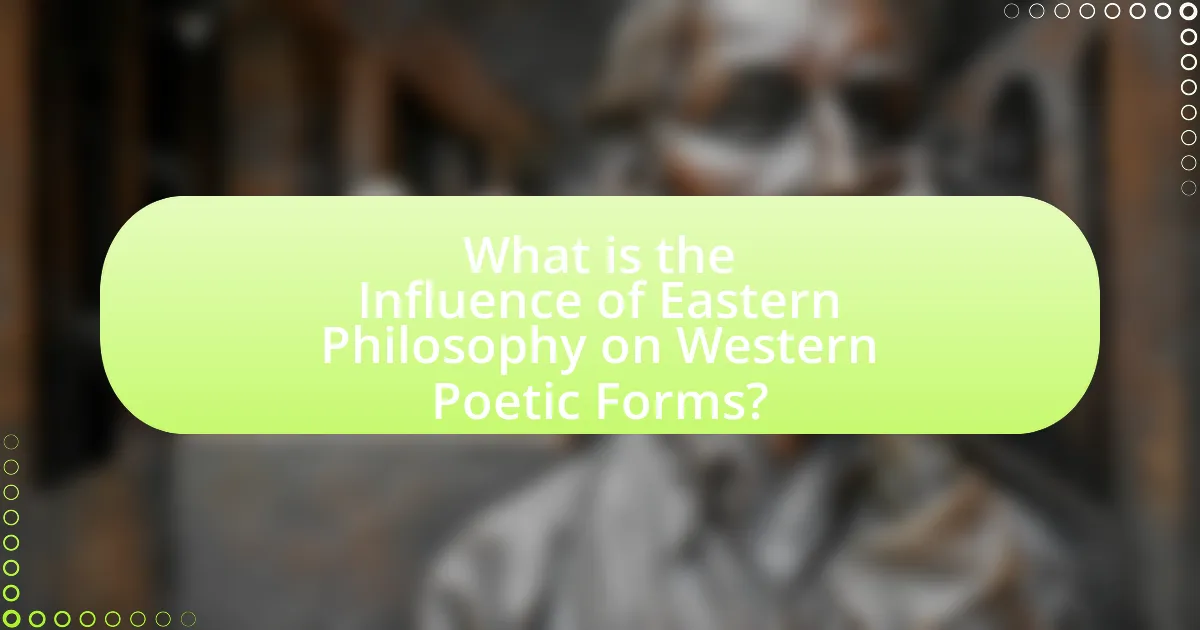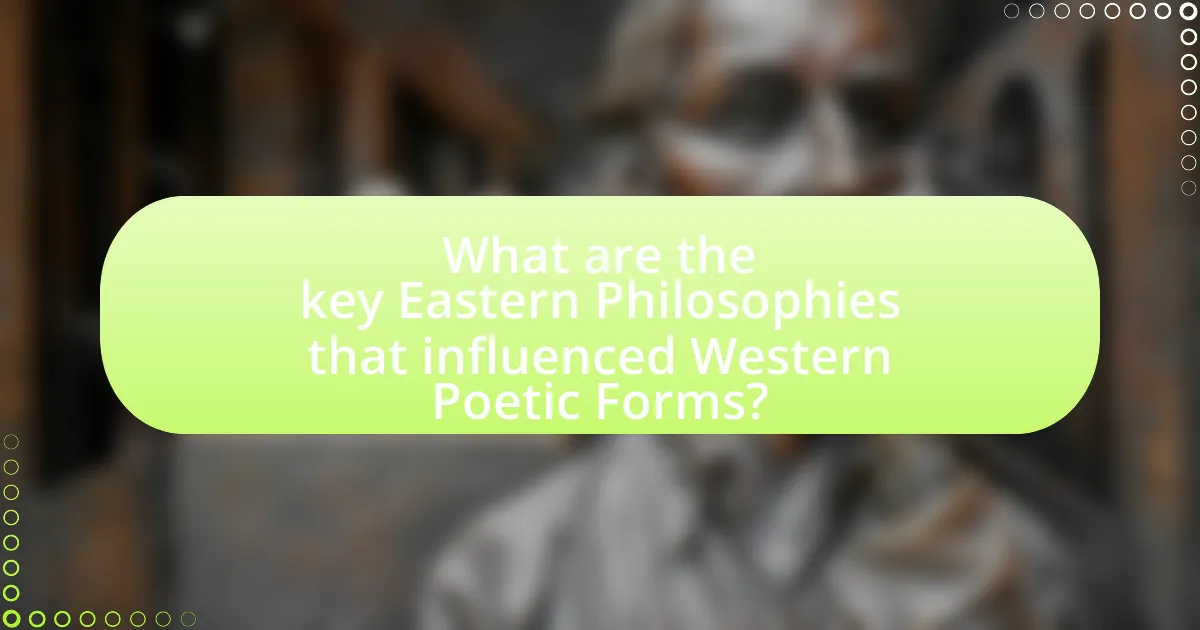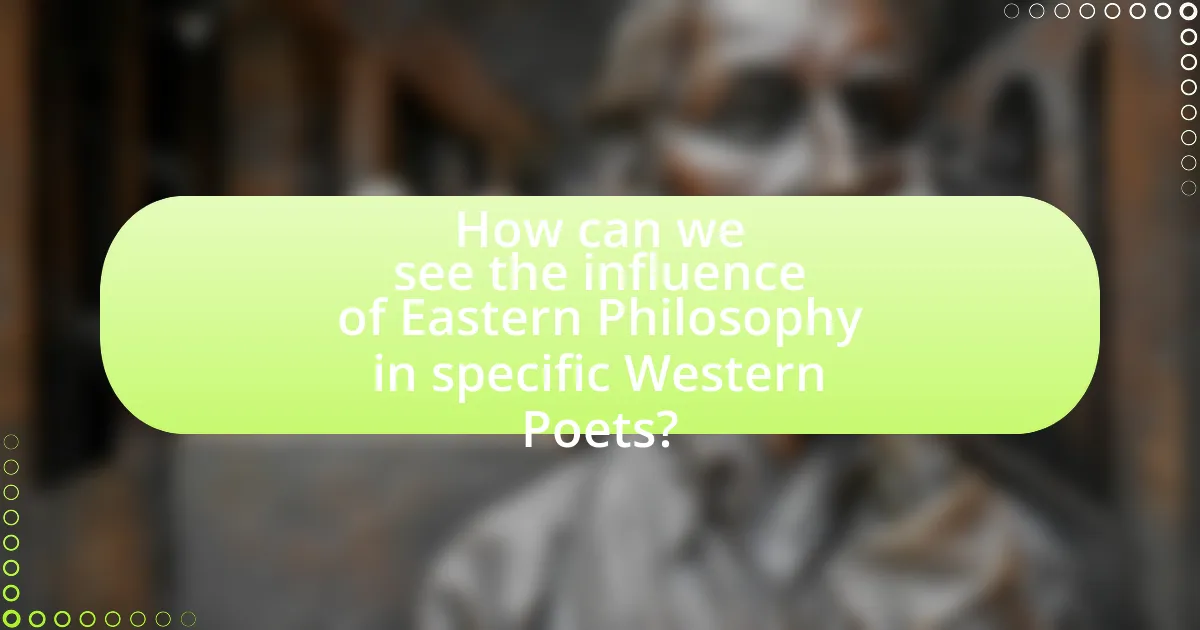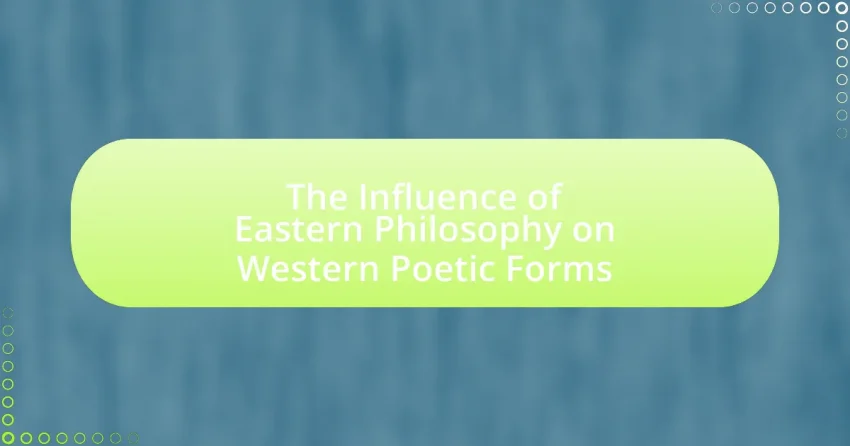The article examines the significant influence of Eastern philosophy on Western poetic forms, highlighting how concepts such as nature, simplicity, and interconnectedness have enriched Western poetry. It discusses historical events that facilitated this cultural exchange, including the Silk Road and the Renaissance, and identifies key Eastern philosophies like Taoism, Buddhism, and Confucianism that have shaped Western poetic themes and structures. The article also explores specific poets, such as Ezra Pound and T.S. Eliot, who have integrated Eastern ideas into their works, and analyzes the implications of this cross-cultural dialogue for contemporary poetic practices. Additionally, it addresses how understanding this influence enhances appreciation for poetry and encourages a broader exploration of themes and forms.

What is the Influence of Eastern Philosophy on Western Poetic Forms?
Eastern philosophy significantly influences Western poetic forms by introducing concepts such as nature, simplicity, and the interconnectedness of existence. This influence is evident in the works of poets like Ezra Pound and T.S. Eliot, who incorporated Eastern themes and aesthetics into their poetry. For instance, Pound’s “The River Merchant’s Wife: A Letter” draws directly from a Chinese poem, reflecting the emotional depth and imagery characteristic of Eastern literature. Additionally, the use of haiku and other Eastern poetic structures in Western poetry demonstrates a blending of styles that emphasizes brevity and the beauty of the natural world. This cross-cultural exchange enriches Western poetry, allowing for a more diverse exploration of themes and forms.
How did Eastern Philosophy first impact Western poetry?
Eastern Philosophy first impacted Western poetry through the introduction of concepts such as nature, simplicity, and introspection, primarily during the Renaissance when Western thinkers began to engage with Eastern texts. The translation of works like the Tao Te Ching and the teachings of Zen Buddhism influenced poets such as Ezra Pound and T.S. Eliot, who incorporated Eastern themes and styles into their writing. This cross-cultural exchange led to a blending of poetic forms, evident in the use of imagery and the exploration of the self in relation to nature, which became prominent in Western poetry.
What historical events facilitated this cultural exchange?
The historical events that facilitated the cultural exchange between Eastern philosophy and Western poetic forms include the Silk Road trade routes, the spread of Buddhism into Central Asia and Europe, and the Renaissance’s revival of classical texts. The Silk Road, active from around 130 BCE to the 1450s CE, enabled the exchange of ideas, art, and literature between East and West, significantly influencing poetic forms. The introduction of Buddhist texts and philosophies into the Western world during the early centuries CE also played a crucial role, as these texts inspired poets and thinkers to explore new themes and styles. Additionally, the Renaissance, which began in the 14th century, saw a renewed interest in classical literature and philosophy, including Eastern works, leading to a blending of poetic traditions and the incorporation of Eastern motifs into Western poetry.
Which Eastern philosophical concepts were most influential?
The most influential Eastern philosophical concepts include Taoism, Buddhism, and Confucianism. Taoism emphasizes harmony with the Tao, or the natural order, which has inspired Western poets to explore themes of nature and balance. Buddhism introduces concepts such as impermanence and mindfulness, influencing Western literature’s focus on existential themes and the human experience. Confucianism, with its emphasis on ethics, social harmony, and moral development, has shaped Western thought on morality and governance. These philosophies have profoundly impacted Western poetic forms by introducing new themes, structures, and perspectives on life and nature.
Why is the study of this influence important?
The study of the influence of Eastern philosophy on Western poetic forms is important because it reveals the interconnectedness of cultural expressions and enhances our understanding of literary evolution. This influence has led to the incorporation of themes such as nature, spirituality, and existential reflection in Western poetry, enriching its diversity and depth. For instance, the adoption of Zen concepts in the works of poets like Ezra Pound and Gary Snyder illustrates how Eastern thought has shaped Western literary traditions, fostering a dialogue between different cultural perspectives. Understanding this influence allows scholars and readers to appreciate the complexities of poetic forms and the broader cultural exchanges that have shaped literature throughout history.
How does understanding this influence enhance our appreciation of poetry?
Understanding the influence of Eastern philosophy on Western poetic forms enhances our appreciation of poetry by revealing the interconnectedness of cultural expressions and the depth of thematic exploration. This understanding allows readers to recognize how concepts such as impermanence, nature, and spirituality, prevalent in Eastern thought, have shaped Western poetry, enriching its emotional and intellectual layers. For instance, the incorporation of Zen principles in the works of poets like Ezra Pound and Gary Snyder illustrates how Eastern ideas can transform Western poetic techniques, leading to a more profound engagement with the text. This cross-cultural dialogue not only broadens the scope of poetic interpretation but also fosters a greater appreciation for the diversity and complexity of human experience as expressed through poetry.
What implications does this have for contemporary poetic practices?
The influence of Eastern philosophy on Western poetic forms has significant implications for contemporary poetic practices, particularly in the areas of form, content, and thematic exploration. Contemporary poets increasingly incorporate Eastern concepts such as mindfulness, impermanence, and interconnectedness, which challenge traditional Western notions of individuality and linear narrative. For instance, the use of free verse and non-linear structures reflects the Eastern emphasis on fluidity and spontaneity, as seen in the works of poets like Gary Snyder and Mei-mei Berssenbrugge. This blending of philosophies encourages a more holistic approach to poetry, fostering a deeper engagement with nature and the self, which is evident in the rise of eco-poetry and meditative writing styles.

What are the key Eastern Philosophies that influenced Western Poetic Forms?
Key Eastern philosophies that influenced Western poetic forms include Taoism, Buddhism, and Confucianism. Taoism, with its emphasis on harmony and the natural flow of life, has inspired Western poets to explore themes of nature and simplicity, evident in the works of poets like Walt Whitman. Buddhism’s focus on mindfulness and the transient nature of existence has led to the incorporation of contemplative elements in Western poetry, as seen in the works of T.S. Eliot. Confucianism’s principles of morality and social harmony have shaped the thematic concerns of Western poetry, encouraging a reflection on human relationships and ethics, which can be observed in the writings of poets such as Robert Frost. These philosophies have provided a rich framework that has shaped the thematic and stylistic evolution of Western poetic forms.
How does Buddhism shape Western poetic themes?
Buddhism shapes Western poetic themes by introducing concepts such as impermanence, mindfulness, and interconnectedness. These themes are evident in the works of poets like Gary Snyder and Allen Ginsberg, who incorporate Buddhist ideas to explore the nature of existence and the human experience. For instance, Snyder’s poetry often reflects the Buddhist principle of living in the present moment, emphasizing the beauty of nature and the transient nature of life. Ginsberg’s “Howl” illustrates the interconnectedness of all beings, resonating with the Buddhist notion of compassion and the shared suffering of humanity. This integration of Buddhist philosophy into Western poetry enriches the thematic depth and emotional resonance of the works, demonstrating a significant cross-cultural influence.
What specific Buddhist concepts are reflected in Western poetry?
Specific Buddhist concepts reflected in Western poetry include impermanence, mindfulness, and interconnectedness. These concepts manifest in the works of poets such as Robert Bly and Gary Snyder, who explore themes of transience and the importance of being present in the moment. For instance, Snyder’s poetry often emphasizes the interconnectedness of nature and humanity, echoing the Buddhist idea of interdependence. Additionally, the notion of impermanence is prevalent in the works of poets like T.S. Eliot, who captures the fleeting nature of time and existence, aligning with the Buddhist understanding of the transient nature of life. These reflections illustrate how Western poets have integrated core Buddhist principles into their artistic expressions.
How have Buddhist practices influenced poetic structure?
Buddhist practices have significantly influenced poetic structure by introducing concepts such as impermanence, mindfulness, and the use of imagery that reflects nature and the human experience. These elements have led to the development of forms like haiku, which emphasizes brevity and the capturing of a moment, mirroring the Buddhist focus on present awareness. The practice of meditation in Buddhism encourages poets to explore deeper emotional and spiritual themes, resulting in a more introspective and contemplative style. Additionally, the use of repetition and rhythm in Buddhist chants has inspired similar techniques in poetry, enhancing its musicality and emotional resonance.
In what ways does Taoism contribute to Western poetic styles?
Taoism contributes to Western poetic styles primarily through its emphasis on nature, simplicity, and the interconnectedness of all things. This influence is evident in the works of poets such as Ezra Pound and Gary Snyder, who incorporate Taoist themes of harmony with nature and the importance of spontaneity in their writing. For example, Pound’s “The River Merchant’s Wife: A Letter” reflects Taoist aesthetics by focusing on the natural world and emotional authenticity, mirroring the Taoist principle of aligning with the flow of life. Additionally, the use of imagery and brevity in Western haiku, inspired by Taoist poetry, showcases the impact of Eastern thought on Western forms. This cross-cultural exchange highlights how Taoism has shaped the thematic and stylistic elements of Western poetry.
What Taoist principles are evident in Western poetic works?
Taoist principles evident in Western poetic works include the concepts of naturalism, spontaneity, and the interconnectedness of all things. Poets such as Walt Whitman and Robert Frost reflect these principles through their emphasis on nature and the human experience as part of a larger whole. For instance, Whitman’s “Leaves of Grass” celebrates the unity of humanity with nature, echoing the Taoist belief in harmony with the natural world. Similarly, Frost’s use of rural imagery and exploration of life’s cycles in poems like “The Road Not Taken” illustrates the Taoist idea of following one’s path in accordance with the flow of life. These examples demonstrate how Taoist thought has influenced Western poetry by promoting a deep appreciation for nature and the acceptance of life’s inherent rhythms.
How does the concept of ‘wu wei’ manifest in poetry?
The concept of ‘wu wei’ manifests in poetry through the expression of effortless action and natural spontaneity. Poets often embody ‘wu wei’ by allowing their thoughts and emotions to flow freely, creating verses that reflect a harmonious relationship with nature and the universe. This approach is evident in works influenced by Taoist philosophy, where the emphasis is on simplicity, tranquility, and the beauty of unforced expression. For example, the poetry of Li Bai and Wang Wei illustrates ‘wu wei’ by capturing moments of stillness and the natural world without overt manipulation or contrived structure, demonstrating how the essence of ‘wu wei’ can lead to profound artistic expression.

How can we see the influence of Eastern Philosophy in specific Western Poets?
Eastern philosophy significantly influences Western poets through themes of interconnectedness, impermanence, and introspection. For instance, the works of Walt Whitman reflect the Eastern concept of unity with nature and the self, as seen in his poem “Song of Myself,” where he emphasizes the oneness of all existence. Similarly, the poetry of Ezra Pound incorporates elements of Zen Buddhism, particularly in his use of imagery and brevity, which aligns with the Zen focus on simplicity and directness. Additionally, T.S. Eliot’s “The Waste Land” showcases influences from Hindu and Buddhist philosophies, particularly in its exploration of cyclical time and spiritual desolation, mirroring Eastern views on existence and enlightenment. These examples illustrate how Eastern philosophical concepts permeate the thematic and stylistic choices of these Western poets.
Which Western poets have explicitly drawn from Eastern philosophies?
Western poets who have explicitly drawn from Eastern philosophies include Ezra Pound, who incorporated elements of Chinese poetry and philosophy into his work, particularly in “The Cantos.” Additionally, T.S. Eliot’s “The Waste Land” reflects influences from Hindu and Buddhist texts, showcasing a blend of Eastern thought with Western literary traditions. Furthermore, Gary Snyder’s poetry is heavily influenced by Zen Buddhism, emphasizing nature and mindfulness. These poets demonstrate a clear engagement with Eastern philosophies, enriching their poetic forms and themes.
What works exemplify this influence?
Key works that exemplify the influence of Eastern philosophy on Western poetic forms include “Leaves of Grass” by Walt Whitman, which reflects transcendentalist ideas akin to Eastern thought, and “The Waste Land” by T.S. Eliot, which incorporates Buddhist concepts of impermanence. Additionally, the poetry of Ezra Pound, particularly in “The Cantos,” draws from Chinese literary traditions, showcasing the integration of Eastern aesthetics into Western poetry. These works demonstrate how Eastern philosophical themes have shaped the structure and content of Western poetic expression.
How did these poets interpret Eastern philosophical ideas?
These poets interpreted Eastern philosophical ideas by integrating concepts such as interconnectedness, impermanence, and the nature of reality into their works. For instance, poets like Ezra Pound and T.S. Eliot drew from Zen Buddhism and Taoism, emphasizing the transient nature of life and the importance of the present moment. This is evident in Pound’s use of imagery that reflects the fleeting beauty of nature, mirroring the Eastern idea of impermanence. Additionally, Eliot’s “The Waste Land” incorporates Eastern themes of cyclical time and spiritual renewal, showcasing a blend of Western and Eastern thought. Such interpretations highlight how these poets adapted Eastern philosophies to enrich their own poetic expressions and explore universal human experiences.
What are the stylistic changes in Western poetry due to Eastern influences?
Eastern influences have introduced several stylistic changes in Western poetry, notably through the incorporation of free verse, imagery, and themes of nature and spirituality. The adoption of free verse, which emphasizes natural speech rhythms over traditional meter, can be traced back to the influence of Japanese haiku and Chinese poetry, which prioritize brevity and emotional resonance. Additionally, Western poets have increasingly utilized vivid imagery and symbolism, drawing from Eastern traditions that emphasize visual representation and metaphorical depth. For instance, the works of poets like Ezra Pound and William Carlos Williams reflect these stylistic shifts, as they embraced Eastern aesthetics to create more evocative and concise expressions of experience. This blending of styles has enriched Western poetry, allowing for a more diverse exploration of themes and forms.
How have forms like haiku and tanka been adapted in Western poetry?
Haiku and tanka have been adapted in Western poetry primarily through structural modifications and thematic explorations. Western poets often maintain the syllabic structure of haiku, typically 5-7-5, while infusing personal and contemporary themes, diverging from the traditional focus on nature and seasons. Tanka, with its 5-7-5-7-7 format, has similarly been embraced, allowing for more emotional depth and narrative complexity, often reflecting personal experiences or social issues.
For instance, poets like Jack Kerouac and Allen Ginsberg have incorporated these forms into their works, demonstrating a blend of Eastern aesthetics with Western sensibilities. This adaptation reflects a broader trend of cross-cultural exchange, where Western poets seek to explore brevity and immediacy in expression, akin to the original Japanese forms. The influence of Eastern philosophy, particularly Zen Buddhism, has also encouraged Western poets to embrace simplicity and mindfulness in their writing, further enriching the adaptation of haiku and tanka.
What new themes have emerged in Western poetry as a result?
New themes that have emerged in Western poetry as a result of Eastern philosophy include mindfulness, interconnectedness, and the exploration of the self. These themes reflect a shift towards introspection and a deeper understanding of the relationship between the individual and the universe. For instance, poets like Gary Snyder and Anne Waldman have incorporated Zen Buddhist concepts, emphasizing the importance of presence and awareness in their works. This integration of Eastern thought has led to a broader exploration of existential questions and the nature of reality, as seen in the works of contemporary poets who draw inspiration from Taoism and Buddhism.
What practical insights can we gain from the influence of Eastern Philosophy on Western Poetic Forms?
The influence of Eastern Philosophy on Western Poetic Forms provides practical insights into the integration of themes such as nature, spirituality, and the interconnectedness of existence. For instance, the use of imagery and symbolism in haiku has inspired Western poets to adopt concise and evocative language that captures fleeting moments, reflecting a deeper awareness of the natural world. Additionally, concepts like Zen mindfulness have encouraged Western poets to explore the present moment, leading to a more introspective and contemplative style. This cross-cultural exchange has enriched Western poetry, allowing for a broader emotional range and a deeper philosophical inquiry into the human experience.
How can poets incorporate Eastern philosophical concepts into their work?
Poets can incorporate Eastern philosophical concepts into their work by integrating themes such as impermanence, interconnectedness, and mindfulness. For instance, the concept of impermanence, central to Buddhism, can be reflected in poetry that emphasizes the transient nature of life and emotions, as seen in the works of poets like Matsuo Bashō, who captures fleeting moments in nature. Additionally, the idea of interconnectedness, prevalent in Taoism, can be expressed through imagery that illustrates the relationship between humanity and nature, fostering a sense of unity. Mindfulness, a key aspect of Zen philosophy, can be woven into poetry through careful attention to detail and present-moment awareness, encouraging readers to engage deeply with the text. These approaches not only enrich the poetic form but also resonate with the philosophical underpinnings of Eastern thought.
What best practices can be adopted for blending these traditions in poetry?
To effectively blend Eastern philosophy with Western poetic forms, poets should adopt practices such as thematic integration, stylistic experimentation, and cultural sensitivity. Thematic integration involves exploring concepts like impermanence and interconnectedness, which are central to Eastern thought, and weaving them into Western poetic structures. Stylistic experimentation encourages the use of forms like haiku or free verse, allowing for a fusion of brevity and depth characteristic of Eastern poetry with the narrative complexity often found in Western traditions. Cultural sensitivity is crucial; poets must respect and accurately represent the philosophies and traditions they draw from, ensuring authenticity and avoiding appropriation. These practices are supported by the increasing recognition of cross-cultural influences in literature, as seen in the works of poets like Gary Snyder and Li-Young Lee, who successfully merge these traditions.
